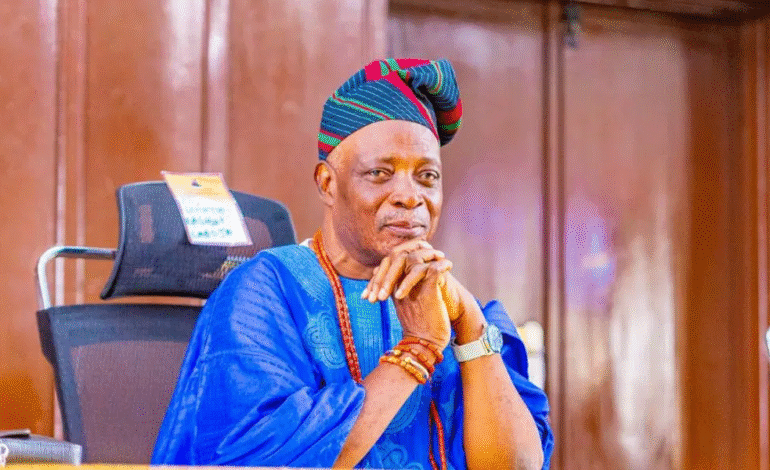Allegations of compromise and partiality have rocked the Christian Association of Nigeria (CAN) and the Pentecostal Fellowship of Nigeria, the two major Christian bodies in Nigeria.
Reverend Yinka Yusuf, the lead pastor of a Lagos-based church, Household of Love Churches, alleged that he was forced to cancel a one-million-man crusade by the two associations despite investing millions of naira in transporting equipment to Uyo, Akwa Ibom State, the planned venue of the event.
While apologising to the 5,000 evangelists he claimed were heading to Nigeria from the United States of America, United Kingdom, South Africa, Australia, Namibia, he said the Christian bodies also compelled the Akwa Ibom State Government to withdraw approval for the use of a venue he already paid for.
But the Akwa Ibom State Government, in a rebuttal, accused Yusuf of hate speech, threatening to take legal action against him and demanding proof of the invitees.
The allegations are coming barely two months after the President of the Word Assembly Ministries, Rev. Isaac Omolehin, also accused PFN of hypocrisy and hostility.
The issues
The Christian Association of Nigeria is the umbrella body representing the interests of all denominations in Nigeria — Catholic, Protestant, Anglican and other blocs.
The Pentecostal Fellowship of Nigeria, on the other hand, is a specialised umbrella organisation representing Pentecostal and Charismatic churches across the country.
Yusuf, while announcing the cancellation of the ‘Uyo One Million Crusade’ in a Facebook post on Friday, said it was regrettable that the crusade, scheduled for February 9 to 15, would no longer hold.
He alleged that CAN and PFN insisted he reschedule the seven-day programme because of another event featuring a Kenyan prophet.
Yusuf said the Kenyan prophet crusade was not on the same days as his, questioning CAN and PFN’s insistence that his event be shifted.
According to him, the state government, in a letter by the agency that manages public facilities, withdrew an earlier approval of Ibom Hall for his crusade, citing “security concerns” and the “prevailing security situation in the state.”
The letter, dated January 27, was signed by the Chief Executive Officer of the Akwa Ibom Property and Investments Company Limited, Patrick Udomfang.
The cleric claimed he had paid the state government for the use of the hall, accusing the government of bowing to pressure from CAN and PFN.
“We have come to the end of the road for Uyo. The government, PFN, and CAN have insisted that I must reschedule our crusade to accommodate the Kenyan government, PFN, and CAN crusade by moving it forward by one week.
“We have decided to act according to the word of God and move to the next city. We have spent over N43m on this crusade project, moving our trucks and trailers to Uyo and conducting mass publicity with numerous billboards around the city.
“We apologise to the 5,000 evangelists we invited to Uyo from around the world; many have already purchased their tickets from America, the UK, South Africa, Australia, Namibia, among others. We are called to win souls and not to have conflicts with anyone. Therefore, we are withdrawing our trucks and trailers back to Lagos,” the cleric wrote.
Yusuf questioned why security concerns were raised against his programme when other large crusades, including one ongoing in Uyo by the General Superintendent of the Deeper Christian Life Ministry, Pastor William Kumuyi, were proceeding without issues.
Describing the situation as unfair, he accused CAN and PFN leaders in Uyo of working against evangelistic ministries, insisting that his mission was not to establish a church in the state but to convert people for existing churches.
Yusuf also said while he respected CAN and PFN as Christian bodies, no organisation would stop him from preaching the gospel.
“I will do this till I die,” he declared.
Efforts to get the cleric to further substantiate his allegations were unsuccessful, as an official of the church told Saturday PUNCH that Yusuf would not speak further on the matter.
Controversial Kenyan prophet
While Yusuf’s Uyo crusade is scheduled for February 9 to 15, the Kenyan cleric, Prophet David Owuor, is having his from February 13 to 15.
The two crusades intercept for three days.
Also, though the two events are planned for different venues, Owuor is to use Ibom Hall on the last day of his programme.
Owuor, the founder of the Ministry of Repentance and Holiness in Kenya, has faced several high-profile allegations ranging from controversial healing claims to financial exploitation.
He is also known for contentious miracle claims, including assertions of healing HIV/AIDS, cancer and raising the dead.
The National Council of Churches of Kenya condemned claims of miracle healing attributed to Owuor, cautioning the public against accepting unverified assertions of supernatural cures.
He was also accused of coercing followers into surrendering wealth and property.
In 2019, the family of Jane Njagi, a lawyer and former follower, accused him of coercing her into relinquishing property worth millions of shillings.
The allegations prompted a police investigation into property fraud in the church.
In 2025, Owuor distanced himself from viral claims suggesting that he had prophesied the end of the world would occur on August 2, 2025.
The organisers of Owuor’s crusade, Nigeria Christian Revival Forum, declined comment when contacted by Saturday PUNCH.
CAN mum, PFN pledges probe
Efforts to reach the national leadership of CAN over the allegations were unsuccessful.
The National President of the body, Rev. Daniel Okoh, did not respond to calls or messages from our correspondent.
However, the National Director of National Issues and Social Welfare of CAN, Abimbola Ayuba, said he was not aware of the issues.
Further attempts to get clarification from him proved abortive, as he did not respond to subsequent questions.
When Saturday PUNCH contacted the Secretary of the Akwa Ibom State chapter of CAN, Rev. Isang Eyoumoh, he declined comment.
He said, “I’m not permitted to speak to the press on that issue. My chairman has not permitted me to speak on the matter.”
However, the national leadership of PFN said it would investigate the allegations.
Speaking to Saturday PUNCH, the National Secretary of PFN, Bishop David Bakare, said he was unaware of the planned crusade or any alleged attempt to stop it.
According to him, if there were any issues involving PFN, they were likely at the local level and had not been brought to the attention of the national leadership.
Bakare assured that the matter would be looked into now that it had been brought to the attention of the national leadership.
He insisted that PFN does not block crusades.
Bakare added that the group had collaborated with several clerics in the past, including Yusuf, and that such engagements had been successful.
“If he (Yusuf) has any challenges with PFN, he should approach us and let us resolve them. I think the issue now is at the local level of PFN; it has not been brought to my notice.
“But now that I am hearing from you, I will find out what is happening, and it will be resolved. It will be no problem. PFN does not stop people from doing crusades. PFN encourages crusades. Anything that has to do with winning souls, Pentecostals will always be at the forefront of it.
“We have collaborated with several people on such meetings before. Even with Rev. Yinka Yusuf, there was a lot of collaboration back in Kaduna that I am aware of. In conjunction with PFN, he held several meetings, and they were very successful,” Bakare said.
He suggested that the controversy might have arisen from a misunderstanding, misreporting, or actions by individuals at the grassroots.
PFN should be proscribed – Omolehin
Reacting, the President of the Word Assembly Ministries, Omolehin, accused CAN and PFN of undermining Christianity in the country.
The cleric, who spoke to Saturday PUNCH, lamented that while churches were facing external threats, internal actions by Christian organisations were further weakening the religion.
He said, “I have been a victim of that; PFN blocked and banned me from preaching in churches both within and outside Nigeria. Joshua Iginla in Abuja also suffered the same fate. Osayi Arome in Makurdi was also a victim. They forced him out of Nigeria; he is now based in Minnesota. I met him in Minnesota, where he told me that he had suffered more persecution than I had.
“This is an ongoing dilemma in the Nigerian church. I see this as a grand conspiracy beyond man. Satan is making efforts to run down the Nigerian church. The church is facing serious persecution across the country. Churches have stopped conducting night services across the Middle Belt, and more churches are being forced to shut down as a result of insecurity, yet both CAN and PFN are not doing anything about this. Rather, they are persecuting genuine men of God.
“While these external attacks on the church are going on, internal attacks are also being formulated as the final blow to kill the church and create hostility within. When you prevent evangelists and preachers from propagating the gospel, when there is a conspiracy within the body of Christ against the gospel, this is the final blow to kill the church in Nigeria.”
Omolehin described PFN as irresponsible, accusing it of presiding over moral decay among some pastors, which he said had damaged the credibility of Christianity.
Calling for the dissolution of PFN, the cleric said he would assemble a team of lawyers to review the fellowship’s founding documents and determine whether it had breached its obligations, with the intention of petitioning the Corporate Affairs Commission.
He, however, said CAN should remain, arguing that its leadership structure, largely made up of elderly clerics, was not responsible for the current problems within Christianity.
“PFN is an irresponsible organisation because under its watch, the church is dying. They took an oath to protect those under the institution. Hardly a week passes without Pentecostal leaders spewing what I would call disgrace into the Christian space. Many pastors under PFN are indulging in acts that no longer make Christianity attractive.
“All those institutions put in place to regulate our practice and protect practitioners are not living up to expectations. The church is now full of irresponsible leaders who cannot protect their members. Medical doctors, lawyers, and journalists have regulatory bodies saddled with the responsibility of punishing erring members. Christianity also has such bodies to regulate church activities, but they are moribund.
“I think PFN should be proscribed. I will soon assemble a group of lawyers to request PFN’s memorandum and articles of association to determine whether they are living up to their obligations, so that we can approach the Corporate Affairs Commission to proscribe them.
“PFN is no longer relevant, but CAN can remain in operation because the composition of CAN is largely elderly people. Those messing up Christianity in Nigeria are not the elderly but the younger ones in PFN,” the cleric said.
Akwa Ibom knocks cleric
But the Akwa Ibom State Government, on Friday, accused Yusuf of hate speech and disregard for due process.
The government, in a statement by the Commissioner for Information, Aniekan Umanah, dismissed the claim by the cleric that it disapproved the crusade over security concerns.
It said the action was informed by the “vile, inflammatory, and insulting remarks” allegedly made by Yusuf in a widely circulated video, in which he was accused of stereotyping and insulting the people of the state.
According to the statement, the comments were considered a direct affront to the collective identity, dignity, and intelligence of the state’s estimated 7.9 million citizens.
The government described Yusuf’s remarks as inciting and morally objectionable, adding that they were inconsistent with Christian values of love, humility, and respect.
“Hate speech is not evangelism, and insults are not a substitute for doctrine. We do not, and will never, expect any Akwa Ibomite to be a member of a church, ministry, or crusade built on contempt for their identity.
“Globally respected evangelists regularly hold crusades in Akwa Ibom State. At present, the General Suprintendent of the Deeper Life Christian Ministry, Pastor W. F. Kumuyi, is in the State for a crusade, further underscoring Akwa Ibom’s openness and religious tolerance.
“Notably, Pastor Kumuyi formally notified the state and paid a courtesy visit to the Governor, Pastor Umo Eno, at the Government House, Uyo. This is the expected standard of conduct, process, and respect from genuine men of God.
“By contrast, Pastor Yusuf showed blatant disregard for due process and established protocol. He failed to engage relevant government agencies responsible for security, crowd control, and emergency response; did not consult the Christian Association of Nigeria or the Pentecostal Fellowship of Nigeria in Akwa Ibom State; and made unverifiable claims of having over 5,000 participants allegedly coming from across the world. The government hereby challenges Pastor Yusuf to publicly provide credible proof of these claims.
“Accordingly, the Akwa Ibom State Government states clearly, without any equivocation that we do not welcome Pastor Yinka Yusuf’s suspicious crusade in the state due to his denigrating actions, defamatory utterances, and open disrespect for the people, values, and lawful authority of the state.”
The government demanded an apology from the cleric, warning that failure to tender it might leave the government with no option but to seek legal redress.































